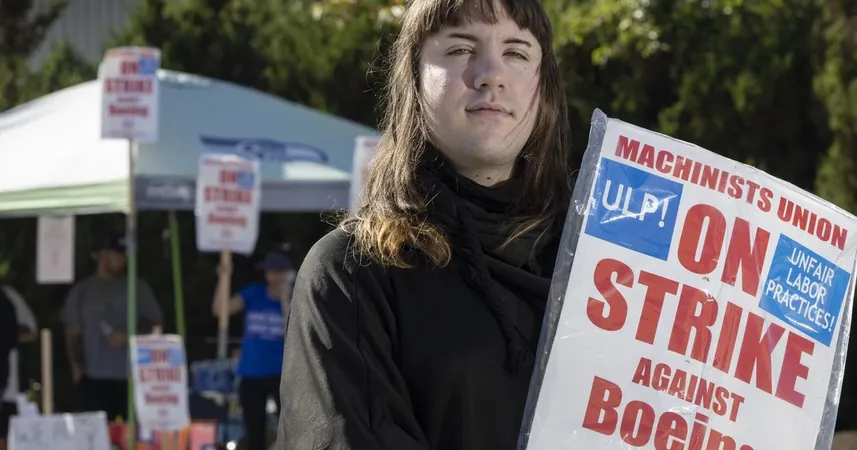
Seattle Boeing Strike Workers: How They Are Coping Financially Amid Uncertainty
2024-09-26
Seattle Boeing Strike Workers: How They Are Coping Financially Amid Uncertainty
As the Boeing Machinists' strike entered its second week, with union members overwhelmingly voting against a contract offer, the impact of financial strain is becoming undeniable. While many had anticipated this strike for a significant time and managed to save up some funds, others, already struggling to make ends meet, now face an uncertain future without their usual paychecks. The thought of depleting savings, incurring credit card debt, or quickly finding alternate employment looms large.
We spoke with a few striking Machinists about their experiences and financial management strategies, providing insight into how the strike affects those at the lower pay scales at Boeing.
Some Workers Find Better Pay Elsewhere
Twenty-two-year-old Mimi Collins began her journey at Boeing in February, excited about her new career. However, her first paycheck was a harsh awakening. As a wire assembler earning $20 an hour, she nets between $2,500 to $3,000 monthly, barely covering her steep living costs—over $2,000 a month on rent and car expenses.
To make up the difference, Collins juggles multiple gigs. On weekends, she drives for DoorDash, where earnings fluctuate between $50 to $200 daily. Additionally, she donates plasma weekly for a supplemental income of around $100. Despite the challenges, including risks of fatigue or illness from plasma donation, she acknowledges that her pay at Boeing limits both her financial stability and personal enjoyment.
Interestingly, Collins has found herself in a better financial situation during the strike. She's taken a position at Target as a materials handler, earning $22 an hour—a slight bump that allows her more free time and financial wiggle room.
“I’m doing better on the strike than off the strike, ironically,” Collins noted. “But I want to get back to a point where my life off the strike is better too.”
Savings Offer a Lifeline
Bianca Stafford, 32, relocated from Florida to Washington in December 2019 and had been preparing for a strike since day one of her employment at Boeing. With living expenses around $3,000 a month, Stafford has amassed a dedicated strike fund through diligent saving practices. Although inflation has eaten into her usual savings plan, she remains optimistic and feels prepared for the transition.
“I’ve been fortunate to save enough to last me for about six months if needed,” said Stafford with a hint of relief.
In contrast, Emma Vu, a young Machinist who began her tenure at Boeing in July 2023, feels less secure financially. With mounting monthly expenses exceeding $2,200 on rent alone, Vu struggles to save anything significant. Anticipating prolonged financial strain, she worries about relying on credit cards soon, wishing her paycheck could better accommodate her lifestyle.
“I wish I were compensated more, so I could live comfortably,” she expressed.
Facing Rising Financial Pressures
Javier Guzman, another 21-year-old, has been with Boeing for three years and earns $21 an hour. While he champions the strike for better pay and work conditions, he admits the associated financial uncertainties weigh heavily on his mind. Recently, Guzman began receiving $250 weekly from the strike fund, along with side work from his girlfriend’s family business to help manage costs.
Rent for his new Shoreline apartment is $1,675, along with estimated monthly expenses in food, utilities, and pet care adding substantial pressure on his budget.
“My costs are covered this month,” Guzman acknowledged, “but if the strike goes into November, I can feel things getting tight. Already, I’m having to use credit cards to get by.”
Striking workers, like Guzman, are faced with the dual challenge of advocating for better conditions while bracing themselves for economic instability. Workers across the picket lines are calling for a fair resolution, with hopes that this strike will bring about not only higher wages but a sense of financial security that now seems out of reach.
“Ultimately,” Guzman said, “we want to return to work—but we deserve better for what we bring to the table.”
As the situation unfolds, it remains to be seen how these brave employees will navigate this delicate balance between their personal needs and collective aspirations.



 Brasil (PT)
Brasil (PT)
 Canada (EN)
Canada (EN)
 Chile (ES)
Chile (ES)
 España (ES)
España (ES)
 France (FR)
France (FR)
 Hong Kong (EN)
Hong Kong (EN)
 Italia (IT)
Italia (IT)
 日本 (JA)
日本 (JA)
 Magyarország (HU)
Magyarország (HU)
 Norge (NO)
Norge (NO)
 Polska (PL)
Polska (PL)
 Schweiz (DE)
Schweiz (DE)
 Singapore (EN)
Singapore (EN)
 Sverige (SV)
Sverige (SV)
 Suomi (FI)
Suomi (FI)
 Türkiye (TR)
Türkiye (TR)